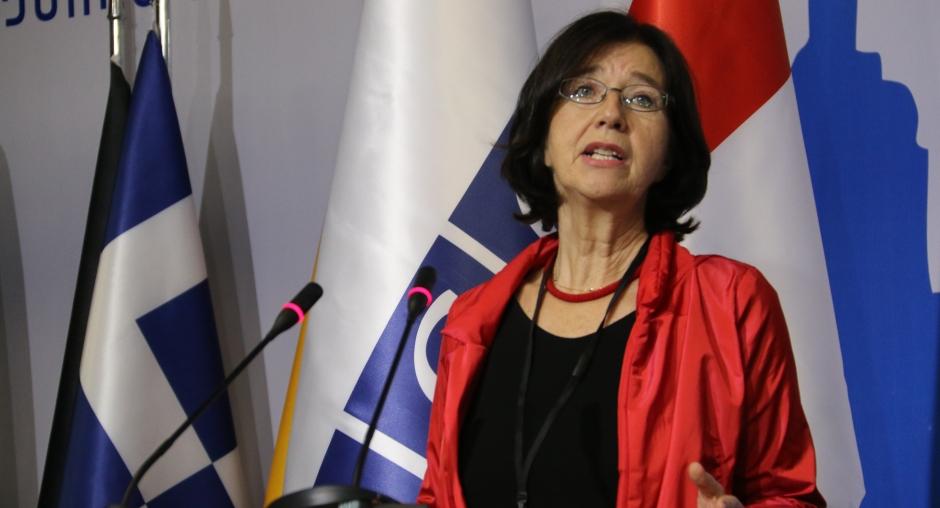OSCE PA President’s meetings in Baku focus on conflict resolution, regional security

By Kamila Aliyeva
OSCE Parliamentary Assembly President Christine Muttonen addressed several pressing issues during her top-level meetings with Azerbaijani authorities in Baku.
Conflict resolution, elections, and the country’s active involvement in the OSCE PA were high on the agenda of the bilateral discussions.
In Baku, the OSCE PA delegation was first received by President Ilham Aliyev, who highlighted the recent initiatives put forward by Azerbaijan and the projects implemented in the country.
The head of state emphasized that Azerbaijan has already become a center of multiculturalism and intercultural dialogue, saying the country is periodically hosting significant events with the involvement of various international organizations.
Providing an insight into the Armenia-Azerbaijan Nagorno-Karabakh conflict, President Aliyev said that Azerbaijan has spared no efforts to ensure a fair and peaceful settlement of the dispute through negotiations, while the Armenian side is interested in delaying the peace talks.
Saying the OSCE attaches great importance to cooperation with Azerbaijan, Muttonen noted that the organization`s representative in Azerbaijan spared no efforts to develop this cooperation. She also pointed out the active work of the Azerbaijani delegation to the OSCE PA, saying they have put forward significant initiatives and resolutions.
The sides also exchanged views on the current state and prospects of the talks on the settlement of the Armenia-Azerbaijan Nagorno-Karabakh conflict.
Given the regular violations of the ceasefire resulting in casualties on the Line of Contact, President Muttonen emphasized the urgency of advancing the Nagorno-Karabakh peace process. She noted that a failure to do so would continue to take an unacceptable human toll as well as undermine peace, stability and economic development in the region as a whole.
In Baku, Muttonen also met with Speaker of the Milli Majlis Ogtay Asadov, Prime Minister Artur Rasizade, and Foreign Minister Elmar Mammadyarov
Asadov noted with regret that despite the ongoing negotiation process with participation of the OSCE Minsk Group, the Nagorno-Karabakh conflict still hasn’t been solved.
The negotiation process can not last indefinitely, and the Minsk Group, which is engaged in resolving this issue, must take more decisive steps, he said.
During her meeting with the Commissioner for Human Rights of the Republic of Azerbaijan Elmira Suleymanova, Muttonen emphasized that the establishment of a dialogue environment in the settlement of the Nagorno-Karabakh conflict is important and the OSCE Parliamentary Assembly is ready to provide any help in this regard.
Muttonen stressed the value of intercultural and interreligious exchanges as complementary confidence-building measures in conflict resolution. “Increased contacts between civil society in Azerbaijan and Armenia could be a powerful way to reduce tensions and promote co-operation,” she said in Baku, according to the OSCE PA.
“There is no alternative to a peaceful political settlement of this conflict,” she stressed.
Suleymanova, in turn, noted that the work of the OSCE Minsk Group on conflict resolution is ineffective and it is necessary to develop new mechanisms.
The sides discussed the development of cooperation between Azerbaijan and the OSCE PA in the field of human rights protection.
Meeting with members of Azerbaijan’s Delegation to the OSCE PA, including Head of Delegation Bahar Muradova and OSCE PA Vice-President Azay Guliyev, the President welcomed the active contribution of Azerbaijani parliamentarians in the Assembly.
Muttonen’s visit to Azerbaijan is her first to the country as OSCE PA President and she noted her hope that the trip signals the Assembly’s strong ongoing commitment to the South Caucasus.
The Armenian-Azerbaijani Nagorno-Karabakh conflict is more than two-decade-old, but still actual. It began in 1988 when Armenia made territorial claims against Azerbaijan. As a result of the ensuing war, in 1992 Armenian armed forces occupied 20 percent of Azerbaijan, including the Nagorno-Karabakh region and seven surrounding regions. More than 20,000 Azerbaijanis were killed and over 1 million were displaced as a result of the large-scale hostilities. The 1994 ceasefire agreement was followed by peace negotiations.
Today, Armenia controls fifth part of Azerbaijan's territory and rejects implementing four UN Security Council resolutions on withdrawal of its armed forces from Nagorno-Karabakh and surrounding regions.
In 1992, the OSCE established the Minsk Group in order to resolve the conflict by peaceful means. However, the organization, co-chaired by Russia, the U.S. and France, still fails to find a solution to the problem.
---
Kamila Aliyeva is AzerNews’ staff journalist, follow her on Twitter: @Kami_Aliyeva
Follow us on Twitter @AzerNewsAz
